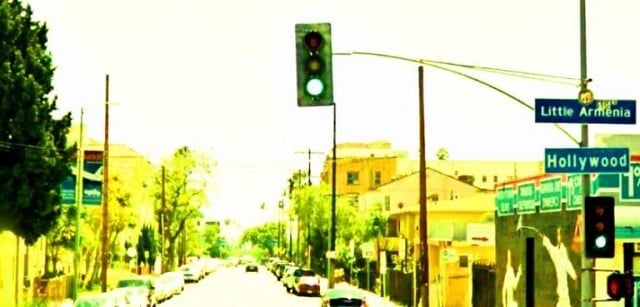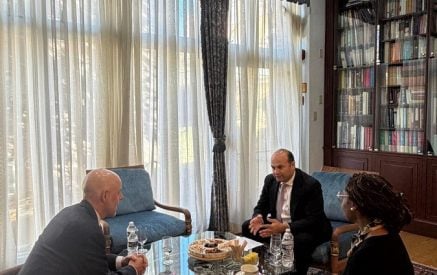Growing up in an Armenian household, the first language I ever learned to speak and communicate in was Armenian. Before having the ability to comprehend the concepts of nationality or geography, the only world that existed in my small understanding of reality was the world which was spent during my adolescence. Having been raised in Little Armenia (a community within East Hollywood), my grandparents’ apartment complex was a melting pot of immigrants from an amalgamation of various countries. This apartment building served as the blank canvas for what would ultimately become the artwork representing my identity.
Looking back at the 17 years that were spent in this multicultural enclave in the heart of Hollywood, one can confidently say that the perfect metaphorical categorization of that experience could simply be labeled as living inside a miniature United Nations summit. Though an overwhelming demographic of the building’s resident population consisted of immigrants from Armenia, there were also tenants from France, Nigeria, Romania, Germany, Mexico and Greece. And since Hollywood (like much of Los Angeles) is a city of transplants and frequent visitors, nothing in my life (besides family and close friends) was permanent. It would become apparent from a very young age that many of my fondest memories and relationships over the years were oftentimes temporary and cut short—a grim but common reality entailed in the Hollywood lifestyle.
Coming from a middle-class American upbringing, both of my parents worked long hours, and so I often wouldn’t see them until nightfall. Throughout most of my youth, my grandparents were the ones who shaped and molded me into the person I would eventually become. My grandfather Gabriel was indeed a fascinating and intriguing man whose mere presence and words of wisdom impacted all those he encountered. Having been born in the small city of Vienne, France, he was commonly referred to as “monsieur” by all his friends and family. After the end of World War II, his family decided to pack their bags and relocate to Armenia. Though he would end up spending more than 20 years in the Soviet Union, my grandfather always took pride in his French nationality. He would later categorize his family’s decision to immigrate to Armenia as a “great travesty.” Of the many distant memories of monsieur Gabriel, I will never forget how much my grandfather always spoke of France with such great compassion and romanticism (naturally). He spoke about the village where he was born and the lifestyle which he longed for every waking day of his life since having left as a child. Many years later, I came to realize how difficult it must have been for him. Though he had not physically been in France since his youth, he always spoke of it as if he had lived there his entire life with such vivid descriptions and vocabulary. He even went as far as becoming a French citizen in 1997!
Read also
Immigrating to the United States, however, wasn’t always his cup of tea (or wine). He always envisioned himself one day returning and living out his final days in a petite house in rural Vienne overlooking the Rhône—the simple French life as he would describe it. Unfortunately for him, the rest of the family had their hearts set on the idea of moving to America instead. Though everyone knew he was greatly disappointed, he wasn’t a man who complained much. After all, this was a person who had lived through Nazi occupation and under Joseph Stalin’s reign. Ultimately, a new life in Los Angeles would symbolize something far more meaningful than just a relocation. It illustrated an escape from the hardships of communism which (in the big picture) was something he and my family would be grateful for. Despite all this, France would continue to hold a sacred place in his heart for the remainder of his life. Whether it was an installation of a satellite dish to receive television channels from France or reading his favorite French novels, he frivolously tried his best to imagine living in his little French village despite the unavoidable palm trees, homelessness and superficiality of Hollywood.
One of the greatest memories of monsieur Gabriel before he passed away was his love for the acoustic guitar. Every couple of days he would pour himself a glass of brandy and play his guitar in the courtyard of the enclave, singing famous tunes by Edith Piaf and Charles Aznavour. His performances almost instantly attracted every tenant in the building. People would grab chairs, fill their cups with wine, smoke their cigarettes and listen to my grandfather as he happily entertained (and sometimes annoyed) his neighbors. It was in those moments when people truly understood the life my grandfather wished he had lived all those years while living in that apartment. He imported the soul of France in a place and to a people who were foreign to that reality. It was during those days where he felt proud to be given the nickname “monsieur!”
As a kid growing up in the United States during the nineties, I never really made much of those evenings with music and wine. I was usually found inside hooked on some video game like a zombie for hours on end. While the melancholic sounds of my grandfather’s guitar were unavoidable, it was difficult at such a young age to grasp or appreciate those moments. When my grandfather passed away in the winter of 1999, there was an unquestionable void inside the apartment complex where he was admired and loved for all those years. As I grew older and entered adulthood, a genetic reincarnation took place which until this day comes as an eerie shock to all those who knew my grandfather well. Besides the incontestable resemblance in appearance, speech and physical tendencies, I began to embody much of my grandfather’s personality. In a strange way, I was learning more about him through my own actions than I did from actual memories of him.
Christoph, the manager of the apartment complex, was also a Frenchman who had immigrated to Los Angeles during the 70s with his family. He and my grandfather became close companions despite their age difference. They enjoyed reminiscing about the old country during long walks around the streets of East Hollywood, desperately wishing they were strolling through the Latin Quarter of Paris. After my grandfather’s passing, Christoph would once in a while teach me a little French and German. He even taught me European history back when I couldn’t even point out a single country on the map! One can only comprehend so much at such an adolescent age. Regardless, it’s evident my grandfather would have been proud to see me take such interests. “When people live in a culture and society so caught up in work and work-related stress, they commonly take apathy towards culture, politics, history and the arts,” he’d tell me. “Never become like that.”
After graduating high school in 2006, the time came for me to say goodbye to Kingsley Drive—my second home for 17 years. Coincidentally, it was also in college where I realized the profound impact of my experiences at my grandparents’ multicultural apartment building. I became aware of people commonly noticing a strange accent when I spoke English. At first, I thought it was just a random observation, but after a while it was becoming noticeable by many others as well.
“Your accent sounds really cool. Where is it from?”
“Where were you born? I can’t make out what type of accent you have.”
Oftentimes it came to a surprise to many when I explained that I was in fact born and raised in Los Angeles. I didn’t know how to accept this question, and sometimes those inquiring didn’t know how to accept my answer. But after a while I realized that there was a genuine and unique reason behind this mysterious accent. Just as Italian-Americans from New York City speak with a distinct accent, so do a lot of Armenian-Americans like myself who grew up in Little Armenia.
Whether I liked it or not, my apparent accent was essentially a product of where I grew up and the people that surrounded me all those years. In a certain sense, I could say that I kind of enjoyed it. The environment in which I grew up and the people who helped shape me gave me something unique and special that not too many people could say they possess. Due to a great level of exposure to various languages and accents throughout my life, I became addicted to linguistics—just like my grandfather.
All the love that I have for history, languages, geography, literature and culture can all be attributed to life lessons learned inside that apartment building in East Hollywood. I’m proud to say that I had the chance to experience all that. During times of division and fear, it’s important to understand the basic fabric of American society and history is intertwined with immigration. The import and export of cultures is what has helped America thrive for more than two centuries. I wouldn’t trade my childhood for anyone else’s.
Nowadays, East Hollywood is experiencing a fascinating transformation. I’d be lying if I said I didn’t enjoy it. The place where poet Charles Bukowski and actor Leonardo DiCaprio once called home is witnessing a fresh arrival of young and hip newcomers from around the globe. This gentrification has given the area a much-needed face-lift (no pun intended). Whether it’s the opening of speakeasy bars, French bistros or classic record stores, the streets of Little Armenia have never looked so exuberant and felt so vibrant, especially for natives like myself. It’s safe to say that the melting pot is still alive and well and is here to stay…just with a couple of new flavors.
























































